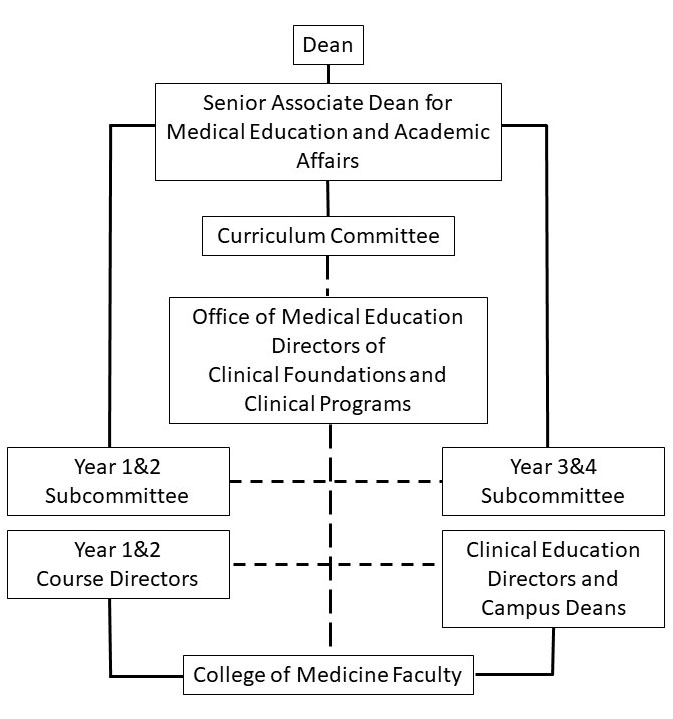Curriculum Committee
Curriculum Organization Chart

Committee Members
Members
- J. Michael Overton, Ph.D. Chair
- Suzanne Baker, MA
- Bill Boyer, DHSc
- Robert Campbell, M.D.
- Luckey Dunn, M.D.
- Kerwyn Flowers, D.O., Chair Year 3/4
- Lisa Granville, M.D.
- Nancy Hayes, Ph.D. Chair, Year 1/2
- Shermeeka Hogans-Mathews, M.D.
- Bryant Howren, Ph.D.
- Pascal Jean-Pierre, Ph.D.
- Cathy Levenson, Ph.D.
- Alma Littles, M.D.
- Antonia Nemec, Ph.D.
- Raed Rizkallah, Ph.D.
- Anthony Speights, M.D.
- Martin Wood, M.S.
Principles
The faculty and the Curriculum Committee of the College of Medicine, in order to assure that our students are provided with a comprehensive medical education that will enable their development as knowledgeable, skilled, and compassionate physicians, subscribe to the following principles of the curriculum.
- The curriculum is student-centered.
- Faculty and instructional methods show respect for the student
- The learning environment is designed to support student needs
- Students are active and critical learners
- The curriculum comprises a context-framed educational plan (regarding how the student would use and apply knowledge).
- Case-based learning is used to stimulate learning and promote the application of basic biomedical and behavioral sciences to clinical sciences
- Clinical presentations with simulated and real patients are used to stimulate learning
- The curriculum flows from a list of basic clinical presentations that provide the foundation for exposure to clinical areas necessary for preparing the undifferentiated medical student for all possibilities for post-graduate training.
- The content is integrated within courses and across years of the program.
- The curriculum is based on the following measurable competencies:
- Patient Care
- Medical Knowledge
- Practice-Based Learning and Improvement
- Interpersonal & Communication Skills
- Professionalism
- Systems-Based Practice
- Interprofessional Collaboration
- Personal and Professional Development
- FSU COM Mission
- Scholarship and the discovery of new knowledge are encouraged and facilitated.
- Opportunities for research are provided
- Scholarly activities in basic sciences, clinical sciences, and community medicine are encouraged
- The educational environment is appropriate to the medical school's mission, and students are educated in the biopsychosocial model. Students are provided with experiences in:
- Geriatrics
- Serving underserved populations
- Serving rural populations
- Understanding of medicine within unique social context

